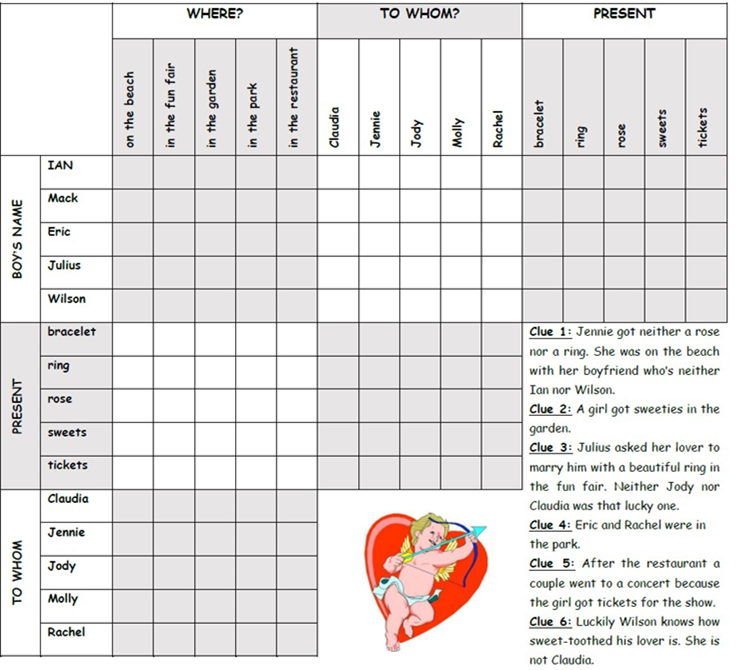St. Valentine's Day. Тиждень іноземних мов
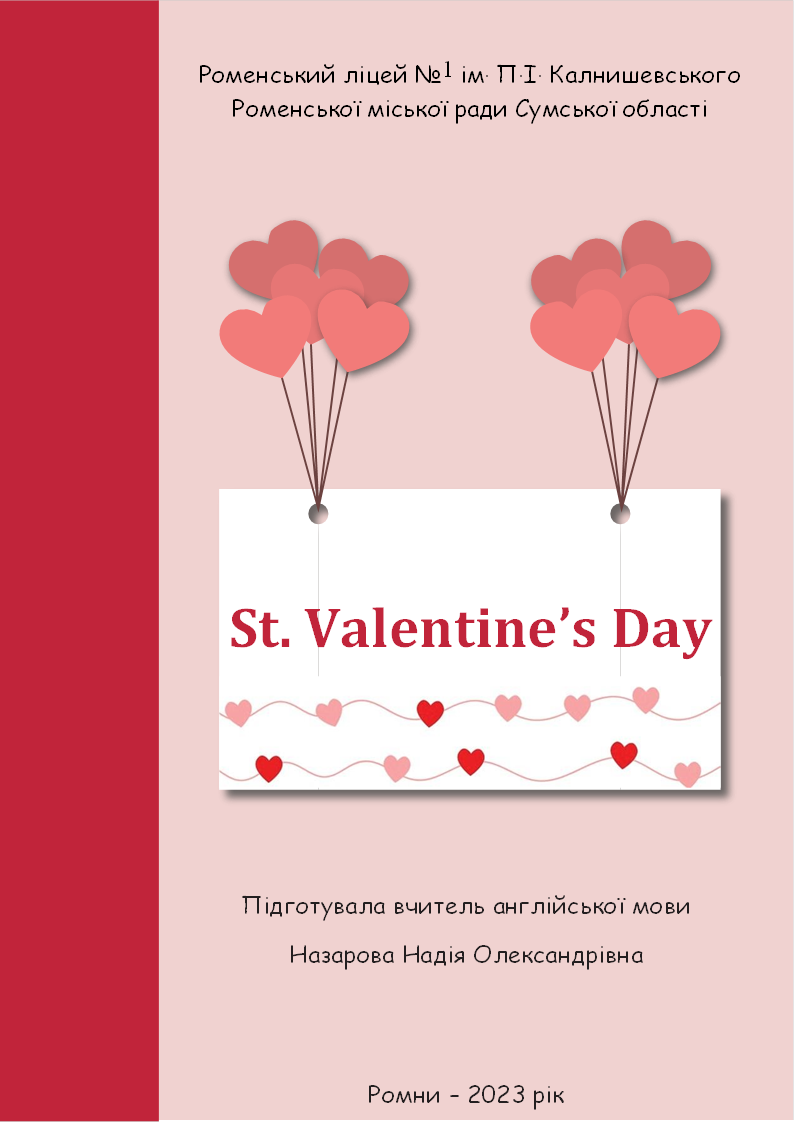
Topic: Saint Valentine’s day Aims:
w to practise and develop vocabulary related to love and romance, relationships and marriage w to practise giving opinions
w to practise reading for specific information
w to practise speaking for fluency
w to develop logic and critical thinking
Age group: secondary
Level: A2-B1
Time: 45 minutes
Procedure Warm up
– Good morning/afternoon, students! Take your seats. Nice to see you! I hope all of you are okay today. Look at the photos of the celebrity couples. Pictures are taken from the official accounts of the celebrities on Instagram. Do you know any of these celebrities? Who is your favourite celebrity couple? Why do you like them? Do you know their love stories?

Lead-in
– Let's think! What will be our topic? Yes! It’s Saint Valentine’s day. When is this holiday?
Group work “Exploring the magic of love in music” (Appendix 1)
– Look at these music notes. Notes in English differ from Ukrainian names. Use this clue to unscramble the words, associated with the holiday.
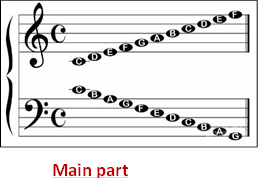
KEYS: candy, heart, chocolate, dance, sweet treat, candy heart, be sweet, sweet, hug me, a sweet card, sweetheart, a huge hug, hug a friend, be a dear, have a heart, be my friend, candy bag, be nice, dear friend, a treat.
Reading (Appendix 2)
– Excellent! Well done! But, do you know the history of this holiday and how it is celebrated around the world? Put the text back together. Number these lines in the correct order.
Lines numbers: 1, 8, 3, 5, 7, 2, 6, 4
– Yes, you’ve got it! And now let’s read the resulting text.
 Valentine's Day is one of the most famous holidays in the world. It falls on February the 14th and is celebrated across the world. It is the traditional day for lovers to express their love to each other. They do this by sending Valentine’s cards with romantic messages. It is common to leave the card unsigned. Other traditions on this day are buying chocolates and giving red roses. Valentine’s Day used to be an American and European thing, but now it has gone all over the world. It has become very commercial. Companies that make Valentine’s goods even encourage people to send Valentine’s cards to their parents and other family members! In Japan, only women give Valentine’s gifts – to all the men they know. There is confusion over which Saint Valentine the day is named after. It is either Valentine of Rome, who lived in the third century, or Saint Valentine, bishop of Terni, from the 14th century. The custom of exchanging romantic messages seems to have started in 19th-century England. In 1847, an American woman, Esther Howland, started producing and selling Valentine cards. Today, over one billion are sent worldwide, with women sending 85 per cent of them. Different companies slowly saw the opportunities to make money from Valentine’s Day. In the 1980s, diamond companies began promoting jewellery as the ultimate Valentine’s gift. French and Italian restaurants are also very busy on this day.
Valentine's Day is one of the most famous holidays in the world. It falls on February the 14th and is celebrated across the world. It is the traditional day for lovers to express their love to each other. They do this by sending Valentine’s cards with romantic messages. It is common to leave the card unsigned. Other traditions on this day are buying chocolates and giving red roses. Valentine’s Day used to be an American and European thing, but now it has gone all over the world. It has become very commercial. Companies that make Valentine’s goods even encourage people to send Valentine’s cards to their parents and other family members! In Japan, only women give Valentine’s gifts – to all the men they know. There is confusion over which Saint Valentine the day is named after. It is either Valentine of Rome, who lived in the third century, or Saint Valentine, bishop of Terni, from the 14th century. The custom of exchanging romantic messages seems to have started in 19th-century England. In 1847, an American woman, Esther Howland, started producing and selling Valentine cards. Today, over one billion are sent worldwide, with women sending 85 per cent of them. Different companies slowly saw the opportunities to make money from Valentine’s Day. In the 1980s, diamond companies began promoting jewellery as the ultimate Valentine’s gift. French and Italian restaurants are also very busy on this day.
St. Valentine’s logic game (Appendix 3)
– That’s incredible! And now feel like cupid! Meet five couples. The boys gave beautiful presents to their lovers. From this game you can find out the couples’ names, where they celebrated and the presents. Look at the clues, fill in the tables, and then write full sentences using the solution. To solve this logic game put an '+' where there is a relation and '-' where there isn't. – Now summarize your answers.
|
NAME |
TO WHOM |
PRESENT |
WHERE |
|
Ian |
Claudia |
tickets |
restaurant |
|
Mack |
Jennie |
bracelet |
beach |
|
Eric |
Rachel |
rose |
park |
|
Julius |
Molly |
ring |
fun fair |
|
Wilson |
Jody |
sweetie |
garden |
– So make sentences. Look at the example: Peter and Molly went to a concert where Peter gave an earring to Molly.
Group work. Writing practice. Rhymes “To my Valentine” (Appendix 4)
– Well done! You are so smart! On Valentine’s Day, people give presents and cards to each other. The cards are called Valentines. Some people buy the cards, some people make them.
– Fill in the gaps with the words to make the Valentine poems. The lines must rhyme!
o Rose are red, Violets are blue, Sugar is sweet. And so are you!
o  There is a little secret I’m wishing to impart: if you listen very closely, you will learn who is my sweetheart!
There is a little secret I’m wishing to impart: if you listen very closely, you will learn who is my sweetheart!
o What shall my little secret be? That I love you if you love me! o Love somebody - Yes, I do. Love somebody - Can you guess who? o Five little stars in a row the first one says: I love you so!
The second one says: will you be my Valentine? The third one says: I will if you’ll be mine! The fourth one says: I’ll always be your friend, the fifth one says: until the very end!
– Super! After our holiday lesson you can choose the poem they like best and write it on a heart- shaped card and “send” to someone by means of a school “Valentine’s Day mail service”. Group work. Speaking (Interview) (Appendix 5) EXTRA ACTIVITY
– Now it is time to discuss the topic of love. Choose some questions to ask your classmates. Summing up
– Thank you, dear children, for your active work today. You are smart and hard-working! That’s all for today. Our holiday lesson is over! See you next time. Goodbye! References
w Valentine Music Notes from https://composecreate.com
w St. Valentine’s Day. Lesson Ideas from https://elt.dinternal.com.ua
w Some activities from https://en.islcollective.com
w Interview Questions from http://college-englishmag.com
w Pictures taken from http://freepik.com, http://pinterest.com
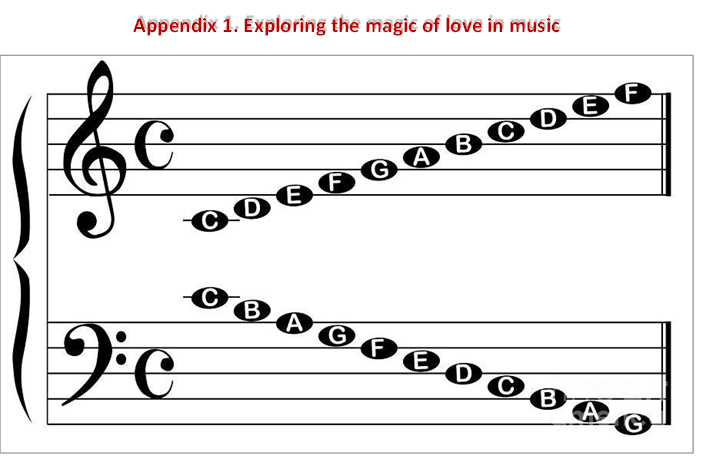
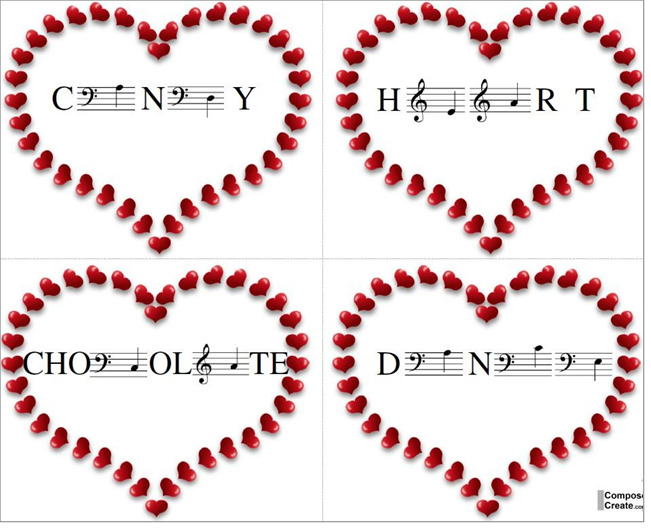
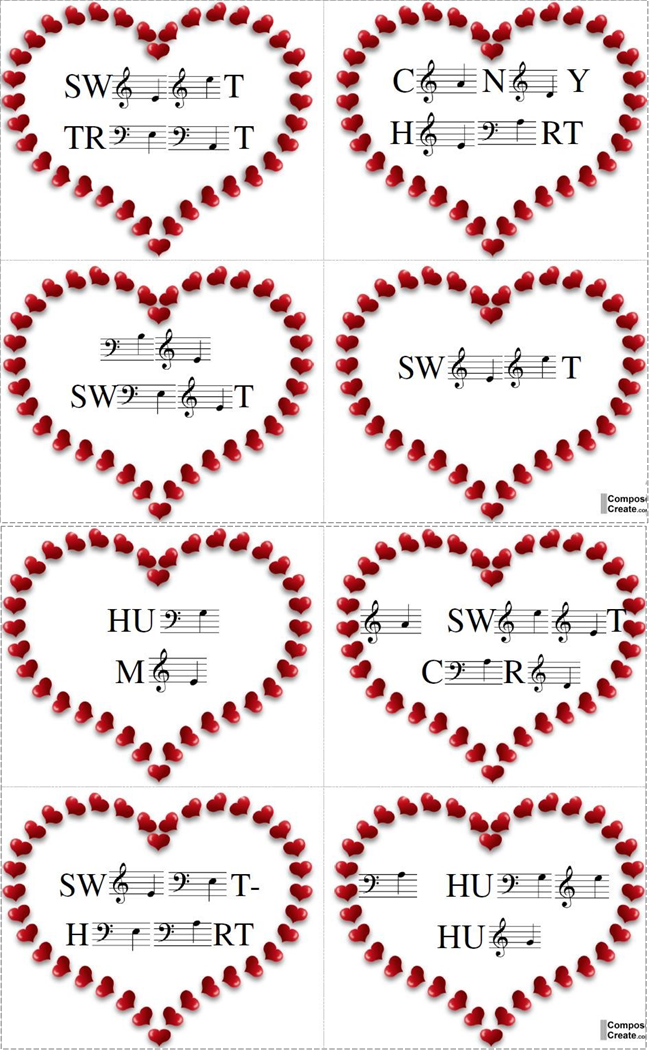
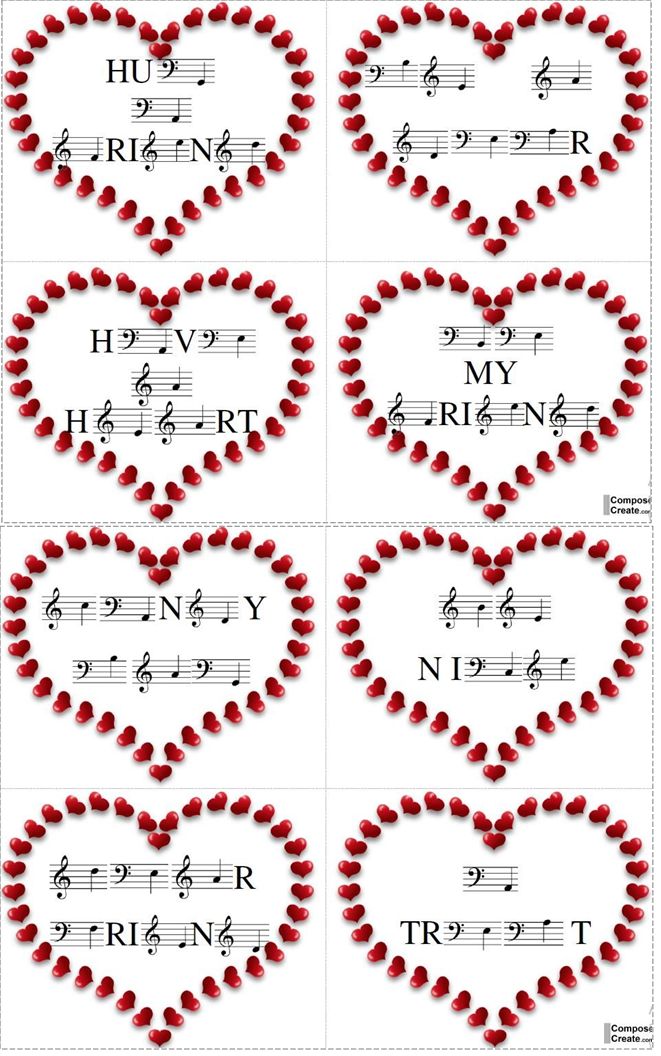
 Appendix 2. Reading
Appendix 2. Reading
|
( 1 ) |
Valentine's Day is one of the most famous holidays in the world. It falls on February the 14th and is celebrated across the world. It is the traditional day for lovers to express their love to each other. They do this by |
|
( ) |
Valentine’s Day. In the 1980s, diamond companies began promoting jewellery as the ultimate Valentine’s gift. French and Italian restaurants are also very busy on this day. |
|
( ) |
gone all over the world. It has become very commercial. Companies that make Valentine’s goods even encourage people to send Valentine’s cards to their parents and other family members! In |
|
( ) |
in the third century, or Saint Valentine, bishop of Terni, from the 14th century. The custom of exchanging romantic messages seems to have started in 19th-century England. In 1847, an American woman, Esther Howland, |
|
( ) |
sending 85 per cent of them. Different companies slowly saw the opportunities to make money from |
|
( ) |
sending Valentine’s cards with romantic messages. It is common to leave the card unsigned. Other traditions on this day are buying chocolates and giving red roses. Valentine’s Day used to be an American and European thing, but now it has |
|
( ) |
started producing and selling Valentine cards. Today, over one billion are sent worldwide, with women |
|
( ) |
Japan, only women give Valentine’s gifts – to all the men they know. There is confusion over which Saint Valentine the day is named after. It is either Valentine of Rome, who lived |
![]()
 Appendix 3. St. Valentine’s logic game
Appendix 3. St. Valentine’s logic game
|
Put an 'X' where there is a relation and '-' where there isn't.
|
||||||||||||||||||||||||
|
Summarize your answers. Then make sentences. Look at the example.
Example: Peter and Molly went to a concert where Peter gave an earring to Molly. |
 Appendix 4. Rhymes “To my Valentine”
Appendix 4. Rhymes “To my Valentine”
|
Fill in the gaps with the words to make the Valentine poems.
|
|||||||||||||||||||||
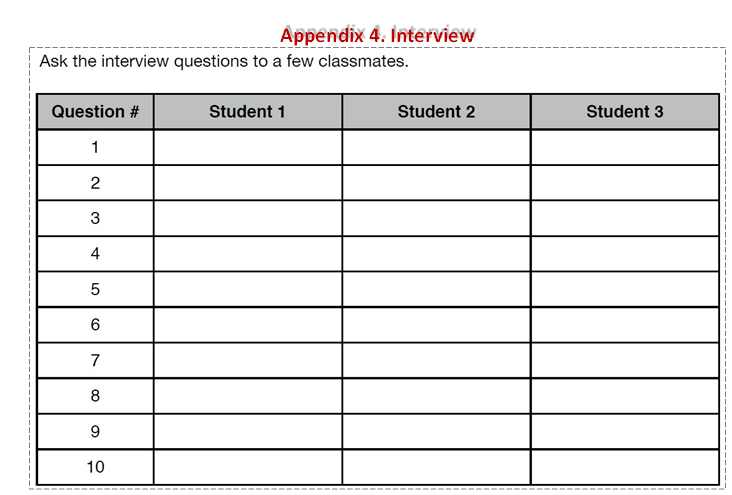
|
Interview questions
♥ Have you been on a date recently? ♥ Do you fall in love easily? How often? ♥ What is the best age to start dating? ♥ What is more important – appearance or character? ♥ What would be your ideal first date? ♥ Have you ever heard about online dating? Can it be serious? ♥ How is showing love different now from in the past? ♥ Is showing affection in public places common in your country? How do elder generations react to it? ♥ Would you prefer to get married or stay single? ♥ Can a single person be as happy as a married person? ♥ Do you think marriage is an old-fashioned idea? ♥ At what age do most people in your country get married? ♥ At what age would you like to get married? ♥ Would you like to have kids? ♥ Do you know anyone who has had a long-term marriage? Do you think they are happy? |


про публікацію авторської розробки
Додати розробку

